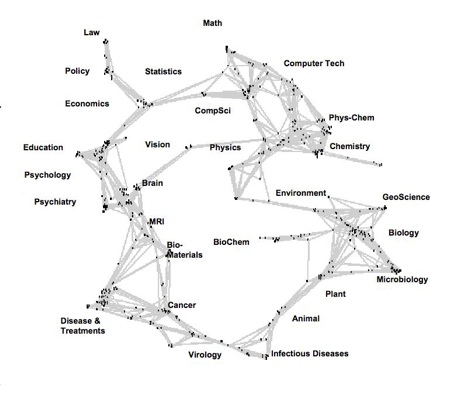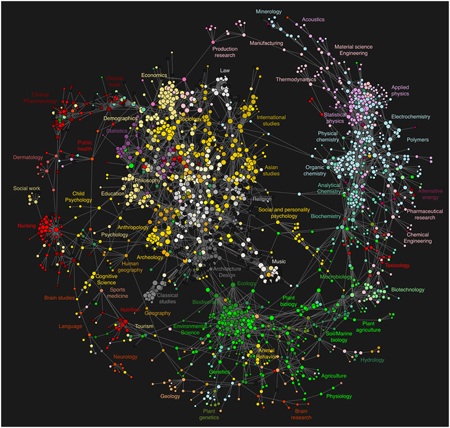Maps of Knowledge
[Translations: Japanese]
Previous maps of the relationship between branches of modern science were done by mapping the citations among journal articles. These citations are footnotes referencing previous articles on the same or related subjects. Citations are the equivalent links in a posting. They take you to the source. Citation indexes tally these links by subject. Mapping software can display the patterns of links. One example is below:

A map of linkage.
A new way of mapping these intra-science relationships has just been published. Instead of mapping links, this new method maps clicks. The program reads the logs of the servers offering online journals (the most popular way to get articles today) and records the clickstream of a researcher as they hop from one article to the next. Then these clickstreams (1 billion interactions in this case) are mapped to sort out the relationships generated by users. Here is their recent portrait of the Map of Scientific Knowledge:

A map of clickage.
According to the authors of the the paper the advantages of the clickstream versus citation method is that clickstreams give you a real time picture and are broader in scope. They note that “the number of logged interactions now greatly surpasses the volume of all existing citations.”
I’ve been wondering about the future of Google and search engines in general. It is obvious that on the web the number of clicks outnumber the number of links. That is, people click more often than they create a link. Yet, to my knowledge, PageRank and other search index ranking algorithms primarily work by weighting links. Wouldn’t be smart to also incorporate the wisdom of crowds of people clicking on sites as well. Mining the clickstream as well as the link graph? I wondered if Google was already doing this? Since so many sites now run Google Adsense (and Analytics), Google knows how often and from where people click on a page, do clicks play any part in PageRank ranking now?
I got a reply from a Google VP in response to my question: “Search quality is based on a combination of page rank and ‘information retrieval score’. Clicks (and other indicators of user interest) play a role in the IR score.”
In other words, Yes. Google does count clickstreams in creating its own maps of knowledge.
The number of clicks will continue to outpace the number of links, so I expect that in the future more and more of the web’s structure will be determined by clickage rather than linkage.


